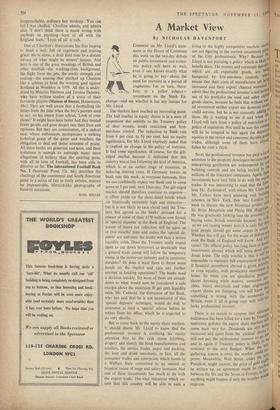A Market View
By NICHOLAS DAVENPORT
The markets have reached an interesting point. The bull market in equity shares is in a state of suspension due entirely to the Treasury policy of dear money, credit restriction and hire- purchase control. The reduction in Bank rate from 6 per cent. to 5+ per cent. had no equity significance, for Mr. Lloyd expressly stated that it implied no change in his policy of restraint. It had some significance, of course, for the gilt- edged market because it indicated that this country was at last following the lead of America, which is at an earlier stage of recession, in reducing interest rates. If Germany lowers its bank rate this week, as everyone forecasts, then we can confidently expect our Bank rate to come down to 5 per cent. next Thursday. The gilt-edged market should therefore continue to improve— it offers yields on the short-dated bonds which are historically extremely high and attractive— but it is not likely to race ahead until the Trea- sury has agreed to the banks' demand for a release of some of their £150 million now frozen in 'special deposits' at the Bank of England. The season of heavy tax collection will be upon us in two months' time and unless the 'special de- posits' are unfrozen the banks will face a severe liquidity crisis. Does the Treasury really expect them to cut down borrowers so drastically that a general trade slump will follow the temporary slump in the motor-car industry and in consumer durables? Or does it want them to throw more bonds on the market and ruin any further attempt at funding operations? The banks need a decision quickly, for most of them are already down to what would now be considered a safe margin above the minimum 30 per cent. liquidity ratio. Mr. Cobbold, the-Governor of the Bank, who has said that he is not enamoured of this 'special deposits' technique, would do well to announce at least a 'special' release before he retires from his office, which he is expected to do very shortly.
But to come back to the equity share markets. It should shame Mr. Lloyd to know that the professional investor is confining his equity attention first to the cash stores (clothing, drapery and shoes), the food manufacturers and retailers, the service trades, paper and packing, the beer and drink merchants, in fact, all the consumer trades and enterprises which boom in a Welfare State committed to an annual or biennial round of wage and salary increases. Not one of these investments has much to do with the export trade. The vital industries which en- sure that this country will be able to earn a living in the highly competitive markets abr°3d are not figuring in the current investment poll of the City professionals. Why? Because r41. Lloyd is not pursuing a policy which is 1 kelY" benefit them. The motors and consumer durables' which are all exportable goods, are be11
hampered by hire-purchase controls, whir _ being
means that their costs of manufacture are , . • increased and their export chances worseneo admit that the professional investor is not tuttILlig ' out of his portfolio the steel and other 007 goods shares, because he feels that with out ell. tal investment neither export nor domestilorsow could survive, but he is not currently adding t° them. He is waiting to see if and when Mr. Lloyd will turn from a policy of restriction to 3 policy of expansion. Not until he sees this corning will he be tempted to buy again the depressed equities in the motor and consumer durable 800di trades, although some of them have alreadY fallen by over a third. Next, the professional investor has paid a 1°t cif attention to the property developers because these enterprising gentlemen are unhampered by a°1 building controls and are being backed by t millions of the insurance companies. Again n. t investments have very little to do with the exPri trades. It was interesting to read that the tabu Ions Mr. Zeckendorf, with whom Mr. Clore and Mr. Cotton have been planning vast building schemes in New York, flew into London last week to discuss the new Montreal project witb Sir Brian Mountain and Philip Hill Higgins°n; lel i is a 31°11 y 1113: Whether this will a for the waste of doll ars , rier your people should get some orders t ttirit.' He was graciously looking into the possitY buying some British materials because, 'as we are raising money here it is only fa even the Bank ofp Al England will know. wls" f °stet cares? The official policy has long been to investments abroad which will bring good diva dends home. The only trouble is that it le impossible to maintain full employment at horitY' if financial investment abroad is given or even equality, with productive investment at )! home. So when you see speculative Pr°Peet tIt'' shares booming while motors, consume[ ceriag ables, heavy electricals and other engin export shares are slumping, you will know that something is wrong with the economics with the Britain, even if all is going very well " lucky professional investor.
There is no reason to suppose that 0°1.°
—.
bullishness has been killed for a time by Tr ea t.s restrictive policies the equity share markets being come back very far. Dividends are still increased and apart from the 'cyclical' shares It will not pay the professional investor to g° °be Lit . to and in again if Treasury policy is likely reversed in the next Budget. When the °X' gathering season is over, the market could e" prove. Meanwhile, Wall Street, under the ° President, might recover, the price of 8°1( inighAt be written up, an agreement might be reached between the Six and the Seven in EuroPe• in faw.icitt' anything might happen if only the weatherw o- i














































 Previous page
Previous page